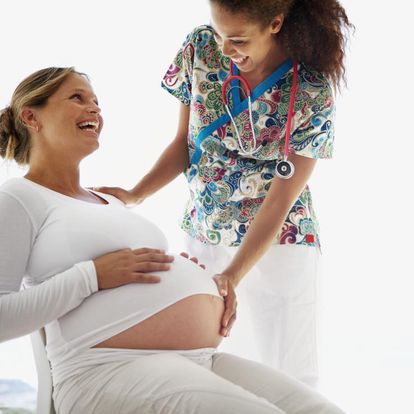33 weeks and 7 days pregnant

This close-up of the baby’s face clearly shows the lip shape and slightly separated eyelids. The slight shadowing seen to the left of the image is from the wall of the uterus, which at this stage of the pregnancy will always be very close to your baby.
If you’ve made the decision to have a home birth, you’ll need to ensure you’re fully prepared in good time.
Women had their babies at home for generations; it was only in the 20th century that women began to have hospital births. If you’re considering a home birth, remember that the majority of pregnancies and deliveries are normal and do not need any medical intervention.
Be reassured that if you have decided to have a home birth and then change your mind, for example if you decide you want an epidural, or your midwife advises you that the baby needs help, you will be transferred to hospital.

Your relationship with your midwife is even more important if you’re giving birth at home as she will be your sole medical support.
What additional things do I need to think about if I’m having a home birth?
Have all the items you need for labour and birth gathered in the place you intend to deliver, and organize your items separately from the baby’s items.
As well as practical items, such as clothing, toiletries, and sanitary pads, you may also want to have to hand music, phone numbers, and a camera. It’s a good idea to have a well-stocked fridge so make a list of nutritious foods to stock up on before your due date. This will help you during labour and in the first week of parenthood. Your baby will need nappies, cotton wool, vests, clothing, sheets, and blankets.
If you have other children, you may need to make arrangements for them to be cared for.
Even though you’re planning to have your baby at home, there are circumstances in which you may need to be transferred to hospital. This can happen before, during, or after labour and so, even though you may not wish to contemplate this outcome, have an emergency bag packed just in case.
Around 20–30 per cent of pregnant women carry the strep B bacteria in the vagina or rectal area. Known as GBS (group B streptococcus), it is usually harmless in adults, but can cause a rare and serious infection in newborn babies if untreated.
There is no routine screening policy in the UK, but some hospitals screen for GBS at 34–37 weeks of pregnancy. If the result is positive, antibiotic treatment can be given during labour that will reduce the risk of the baby becoming infected. Some hospitals don’t screen but if the bacteria is detected in a urine test or a swab is taken for another reason and is positive, antibiotic treatment may given in labour.
The test is very straightforward and involves taking a swab of the area around your vagina and rectum.
If GBS is detected, and treatment given as soon as labour starts, there is little risk to the baby.
It is possible to be infected with GBS in a second pregnancy, even if you didn’t have it first time round.
Be the first to support
Be the first to share
Comment (0)
Related Blogs & Vlogs
No related events found.
Loading more...